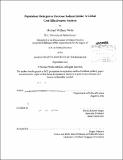Population strategies to decrease sodium intake : a global cost-effectiveness analysis
Author(s)
Webb, Michael William, S.M. Massachusetts Institute of Technology
DownloadFull printable version (6.297Mb)
Other Contributors
Massachusetts Institute of Technology. Department of Political Science.
Advisor
David Andrew Singer.
Terms of use
Metadata
Show full item recordAbstract
Excessive sodium consumption is both prevalent and very costly in many countries around the world. Recent research has found that more than 90% of the world's adult population live in countries with mean intakes exceeding the World Health Organization's recommendation, and that more than a million deaths every year may be attributable to excess sodium. This study uses a simulation model to estimate, for the first time, the cost-effectiveness of government interventions to reduce population sodium consumption in every country in the world. It reveals substantial heterogeneity in cost-effectiveness by country that has never before been identified, and illustrates, also for the first time, the sensitivity of intervention efficacy to the theoretical-minimum-risk exposure distribution of sodium intake. The study makes a number of additional contributions. It offers a comprehensive appraisal of the methodological strengths and limitations of the surveys, imputation models, randomized controlled trials, prospective cohort studies, meta-analyses, and simulation models that together constitute the evidence base for public health recommendations on sodium intake, as well as for this study's own analysis. These methodological issues, some raised for the first time, are evaluated systematically to allow the relative quality of each input to be assessed and to inform prioritization of further research. The study also uses economic theory to ground a discussion of the proper nature and scope of government policies targeting population sodium consumption, and presents an up-to-date survey of sodium reduction initiatives around the world.
Description
Thesis (S.M.)--Massachusetts Institute of Technology, Dept. of Political Science, 2013. Cataloged from PDF version of thesis. Includes bibliographical references (pages 69-77).
Date issued
2013Department
Massachusetts Institute of Technology. Department of Political SciencePublisher
Massachusetts Institute of Technology
Keywords
Political Science.